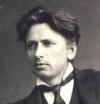Biography
Jeppe Aakjær (born in Aakjær[1] in September 10, 1866 - died in Jenle, April 22, 1930) was a Danish poet and novelist, described in Chambers Biographical Dictionary as "a leader of the 'Jutland Movement' in Danish literature". A regionalist, much of his writings were about his native Jutland. He was known for writings that reflected his concern for the impoverished and for describing rural existence. At the age of 20, he was sent to jail for speaking freely about his concerns, which the local government officials did not care for. Being an outspoken socialist Aakjær joined the Social Democratic Party. He moved to Copenhagen and worked as a proofreader and journalist. From 1907 until his death he lived on his own farm, Jenle (Jutlandish dialect for "Lonely") writing both poetry and prose and enjoying a growing popularity.
Aakjær's notable novels including Bondens Søn ("The Peasant's Son") (1899) and Vredens børn, et tyendes saga ("Children of Wrath: A Hired Man's Saga") (1904) reveal his staunch social commitment. The latter is a rural Danish answer to Upton Sinclair's The Jungle and in many ways caused the same effect but on a lesser scale. He also wrote Jens Langkniv (1915), about a Danish highwayman becoming a guerrilla fighter against the Germans in the 1600s. Many tales and short stories tell about the humble and bad life of farm boys and grooms written in anger and fighting spirit.
Today, it is his poetry for which he is chiefly known. His poems including the famous Fri felt ("Free Fields"; 1905), the Rugens sange ("Songs of the Rye"; 1906) and Heimdal's Wanderings (1924), however, reveal his appreciation for the harvest. Because of their lyrical quality, many of these poems were used as settings for songs by various 20th Century Scandinavian composers, such as Carl Nielsen. In these songs he sings of the moors of his region, the areas of his childhood and the poor life in the country often switching between harsh realism, a fresh love of nature and sentimental nostalgia, not few of his poems are written in dialect. Among his best known are the beloved Jeg er Havren ("I am the Oats"), Jens Vejmand, a tribute to the worn-out roadmender; Jutland (English translation by J. A. Peehl) and Historiens Sang ("The Song of History"). But also as a lyric he often shows himself an agitator writing battle songs for the working class.
Aakjær is one of the most beloved Danish poets of the 20th Century. As a Jutlandish regionalist and dialect writer he is the heir of Blicher but also inspired by Robert Burns whose Auld lang syne he translated into Jutlandish dialact. Together with Johannes Vilhelm Jensen and Martin Andersen Nexø he is one of the outstanding "new realists" from the 1910s though never that famous outside Denmark. In many ways he is a literary figure of transition between old rural culture and modern socialist agitation. He had the special fate for a castigator of society of being popular even among his opponents.
His first wife was the author Marie Bregendahl, known for her regionalist works. ..






